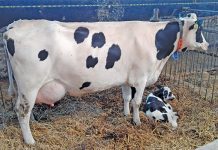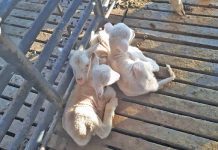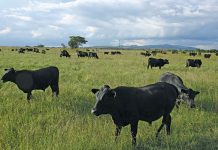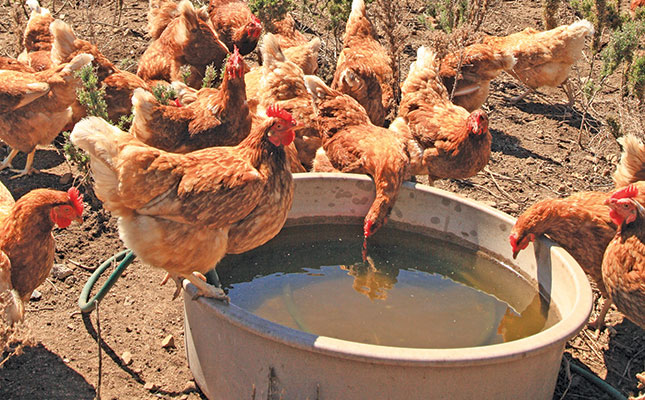
Photo: Glenneis Kriel
Einstein Sibanda typifies the spirit of the entrepreneur: combining luck, energy and grit, he has built a booming free-range farming operation on the edge of Simon’s Town in the Western Cape.
Sibanda, who is originally from Zimbabwe, came to South Africa in 2006 in search of greener pastures.
“I joined a friend and fellow Zimbabwean in Fish Hoek to work in the restaurant industry, but that didn’t work out, so I decided to go into farming instead,” he recalls.
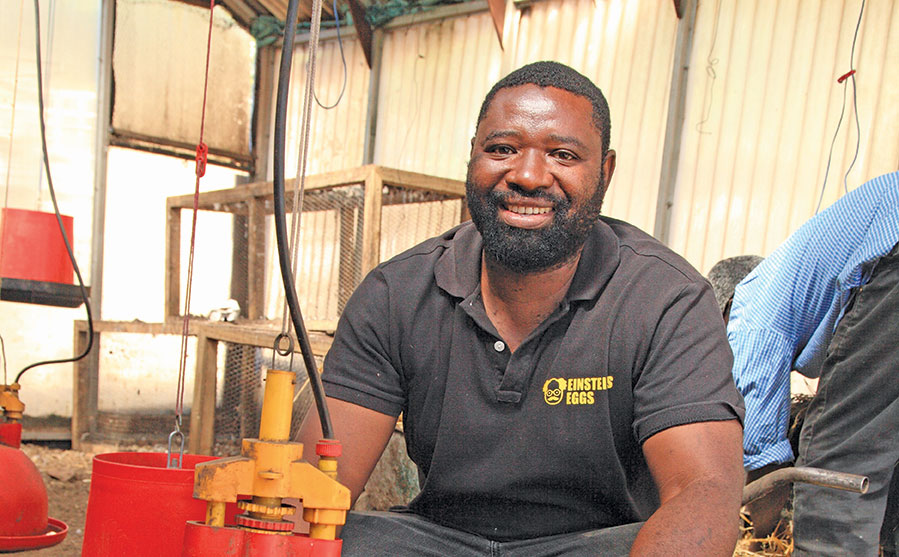
He crossed paths with UK-born Sam Adams who at the time ran a programme called Start Living Green, which focused on equipping smallholder farmers and urban migrants with the skills to farm more sustainably.
“Adams rekindled my love of farming. He also had a strong network with other non-profit organisations, which created an opportunity for me to do an agriculture and business training course at Living Hope in Kommetjie in 2011,” says Sibanda.
While on the course, which lasted for four years, he farmed earthworms and made worm tea (vermicompost), which he used to establish and maintain organic vegetable patches of up to 4m² in the gardens of a growing number of clients.
To boost his supply of vermicompost, Sibanda encouraged his fellow students to produce the worm tea, and then bought it from them.
READ Self-taught worm farmer recycles waste into compost
In addition, he started farming broilers, layers and vegetables on municipal land in Kommetjie in exchange for managing a church’s passion fruit project. However, as the land had been set aside for development, he eventually had to search for an alternative.
He then heard from a friend that Rocklands farm, on the outskirts of Simon’s Town, seemed underutilised, so he asked the owners, the Rowe family, whether he could rent it from them. Delighted with the idea, they helped him set up some infrastructure in January 2017 and establish a market, and he bought his first 2 000 layers.
Today, he farms vegetables, free-range poultry (broilers, layers, and breeders) and pigs at Rocklands.
Business management
According to Sibanda, the agriculture course, particularly the business component, was one of the pillars of his farming success.
“I come from a family of farmers and hunters, but the farming was always a side hustle for us; we never ran it like a business. With my new skills, I started keeping records of what and when I was buying and selling, which gave me some really good insights,” he says.
For example, he would often become attached to some of his layers and keep them too long. But financial record-keeping showed him the folly of this.
READ Broiler production: Cashing in on the huge demand for live birds
“If you wait too long to sell layers as spent hens once egg production starts to drop for a second time, usually at around two-and-a-half years, the birds start eating into your profits. You may end up with less than half the money you need to replace them, depending on how long you’ve kept them,” he says.
The same applies to broilers; Sibanda says that retaining them for more than six weeks simply doesn’t make economic sense.
Keeping records is also important for dealing with the South African Revenue Service (SARS). “If you don’t keep records, you’ll get into trouble with SARS and end up having to pay a lot more tax,” he says.
Sibanda has also learnt the importance of doing the right thing at the right time.
“For example, you need to keep a record of when your sows go into oestrus, because you’ll lose money if you have to wait for their next cycle. Sows should also be brought closer to home at least a week before they’re due to farrow, so you can keep an eye on them and their litters, and deal with any birth complications.”
Customer care is no less important. “Give clients what you’ve agreed upon, be on time for meetings, and communicate with them in good time, so that you can deal with any possible disappointments if you’re unable to satisfy their needs,” he says.
Website
In 2018, web design company Machache offered to build Sibanda a website for free on Mandela Day. The designer sat with him to discuss what he wanted, and the result was a website called Einstein’s Eggs, with the slogan: ‘Free-thinking chickens = intelligent eggs’.
They also designed the logo for Einstein’s Eggs: a man with an egg-shaped head who resembles Albert Einstein, the renowned physicist.
Sibanda says the website helped to raise awareness of Rocklands Farm and significantly boosted his marketing reach. He currently sells his eggs to delicatessens, health stores, restaurants and individuals. Buyers can either collect the produce at the farm, or have it delivered to them.
“I sell some produce to the emerging market. Unfortunately, though, this market is quite price-sensitive, and requires education on the advantages of eating free-range meat and eggs to justify the premiums charged,” he says.
Chickens
To ensure success, Sibanda produces commercial breeds of pigs, broilers and layers. “I use a mixture of different commercial breeds, depending on what’s available. This helps me identify which are best for my production region, and also diversifies risk, because different breeds have different strengths and weaknesses,” he says.
The layers are bought in at point of lay. At the time of Farmer’s Weekly’s visit, Sibanda had about 480 birds, none of which were broilers, as avian influenza has resulted in a shortage of day-old chicks.
“Broilers are the most sensitive of the animals I farm. They need much more protection against stress, whether it’s cold, wind or heat, to prevent diseases from developing and to ensure optimal growth,” he explains.
When Sibanda does have broilers, he keeps them in a deep-litter system, which he tops up with new straw. He also turns it to keep it dry and friable, and to lower the level of ammonia as much as possible.
Breeders are the most resilient of the poultry, as they consist of a large variety of mostly indigenous breeds.
“I keep the breeders with some of the pigs and let them scavenge on the fruit and vegetable scraps fed to the pigs. I also give them grains. These birds are like a hobby for me. I’m trying to see if I can develop my own breed and some uniquely coloured eggs.”
The broilers and layers, in contrast, receive premixed commercial rations and have access to Sibanda’s patches of microgreens, which consist of barley and vegetables.
Earthworms and vermicompost are introduced to the vegetable patches to ensure that the birds have access to sufficient greens and protein. The layers also receive seasonal fruit and vegetables, depending on the price of the produce.
“Allowing the birds to feed in my vegetable patches and eat scraps [from the pigs] has helped to halve my feeding costs,” says Sibanda.
The broilers and layers are vaccinated before their arrival at Rocklands, and Sibanda administers no other form of medication. He does, however, add aloe juice to the drinking water to control internal parasites and boost the birds’ immunity. He also adds wood ash to the production areas for the birds to bathe in, which helps keep ectoparasites in check.
Free-range pigs
In 2020, Sibanda expanded production to include free-range pigs, initially testing the system with three pigs that a friend had given him.
“Before farming something new, it’s best to test it on a small scale, then build it up from there once you’re certain it’s suited to the environment and you’re more proficient at producing it.”
This year, he had six sows of a Landrace and Large White mix, which farrowed a total of 58 piglets.
The pigs scavenge outdoors and are supplemented with vegetable and fruit waste from restaurants, as well as brewer’s malt acquired from a nearby microbrewery.
Sibanda’s livestock have never struggled with diseases, probably because there are no other poultry or pig farms nearby. Nonetheless, he was apprehensive during the recent avian influenza outbreak, when some of the penguins in the area tested positive for the disease.
“To reduce the risks, I increased biosecurity measures and kept the birds in-house,” he says.
Sibanda is toying with the idea of opening a small butchery to add value to his products, and including rabbits in his product offering.
He says that while farming at the tip of Africa is a dream come true, he and his wife, Innolia, are not rooted in South Africa, and will probably move back to Zimbabwe, or even Botswana, where his mother lives, if the opportunity presents itself.
“I’ve been very fortunate to have my business grow the way it has, but farming is always easier when you have your own land or a 99-year lease, as it gives you an incentive to invest in modern farming equipment and infrastructure.
“With a short-term lease, there’s always the risk that you might have to move your operation elsewhere,” he says.
Email Einstein Sibanda at [email protected], or visit einsteinseggs.com.

